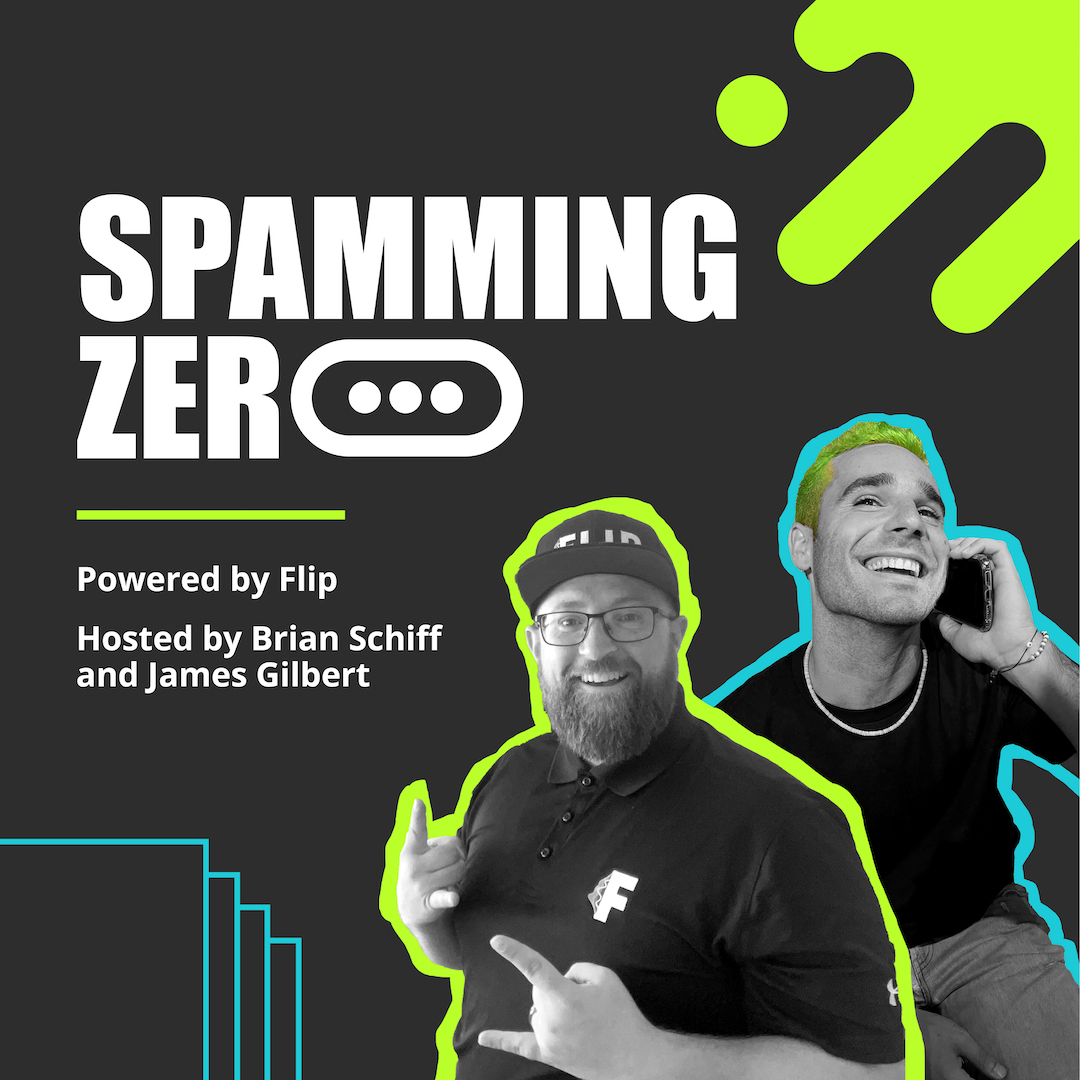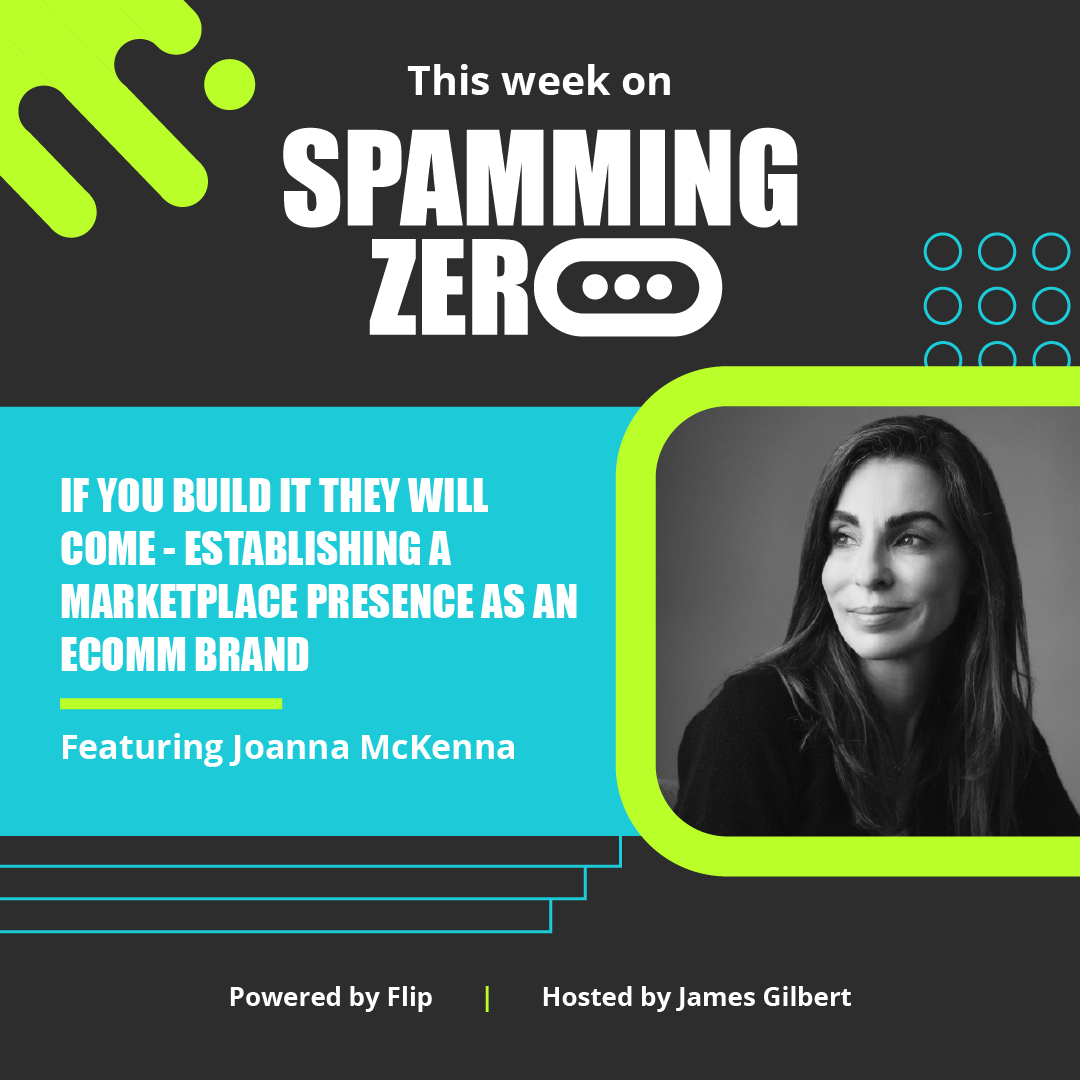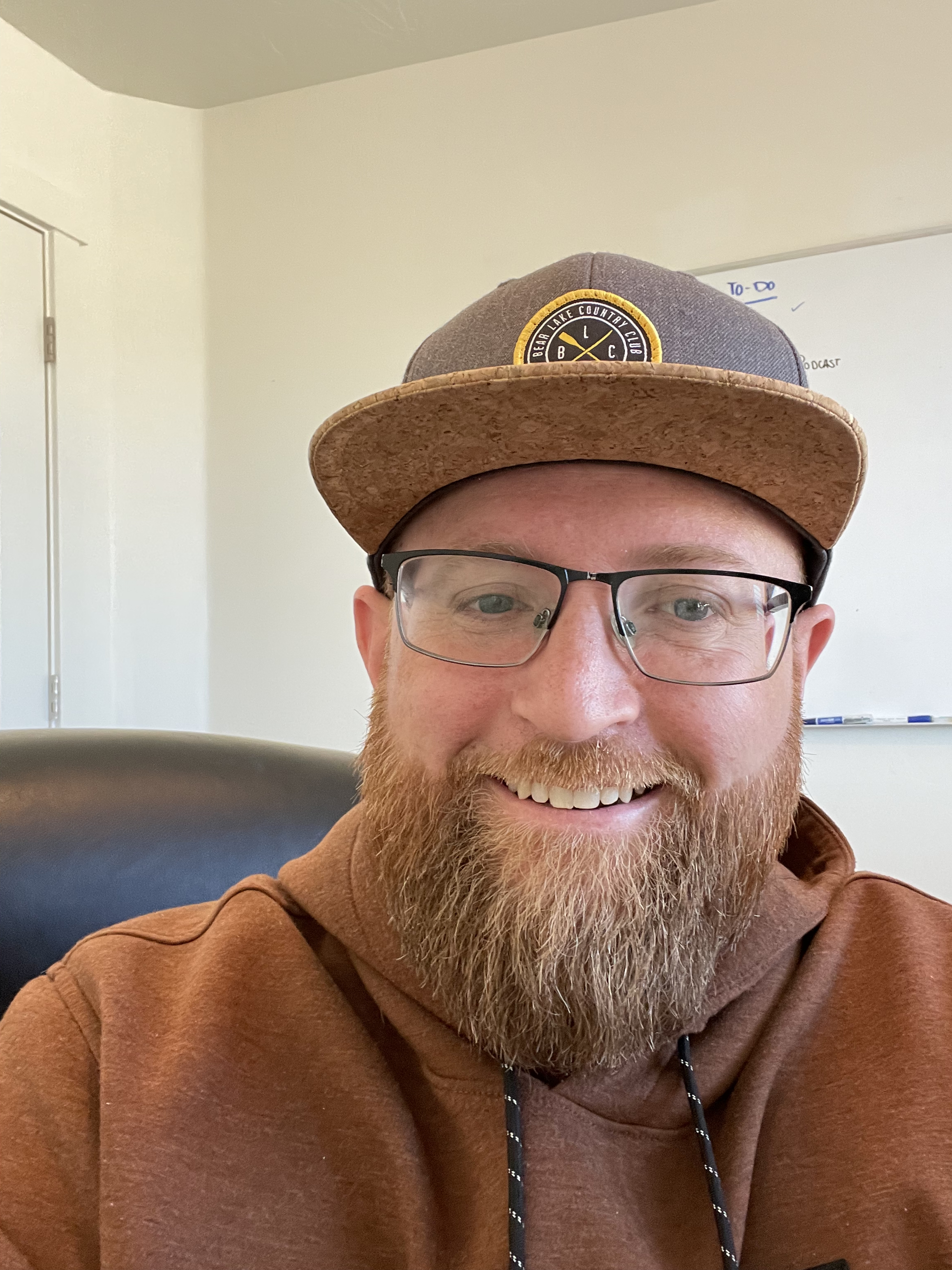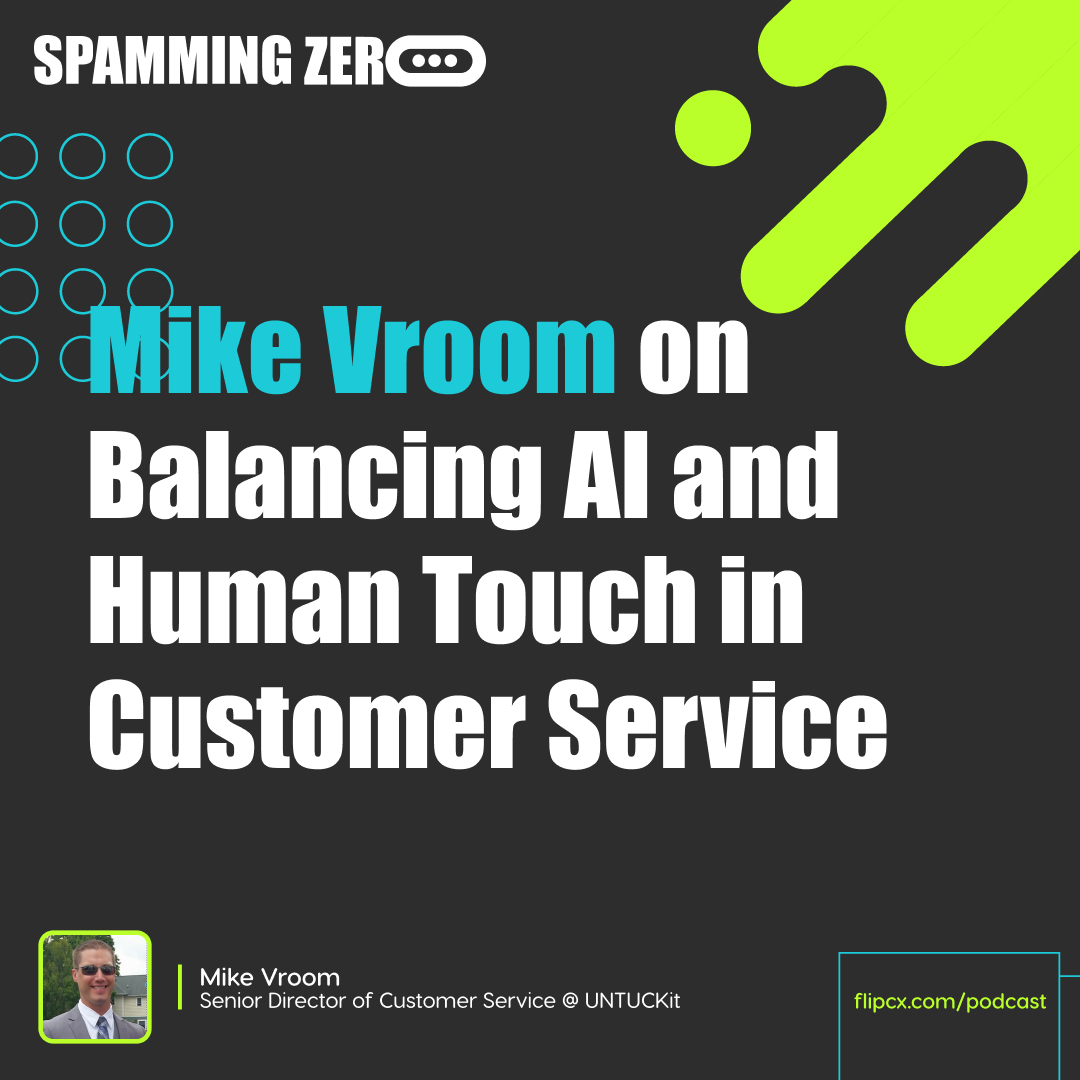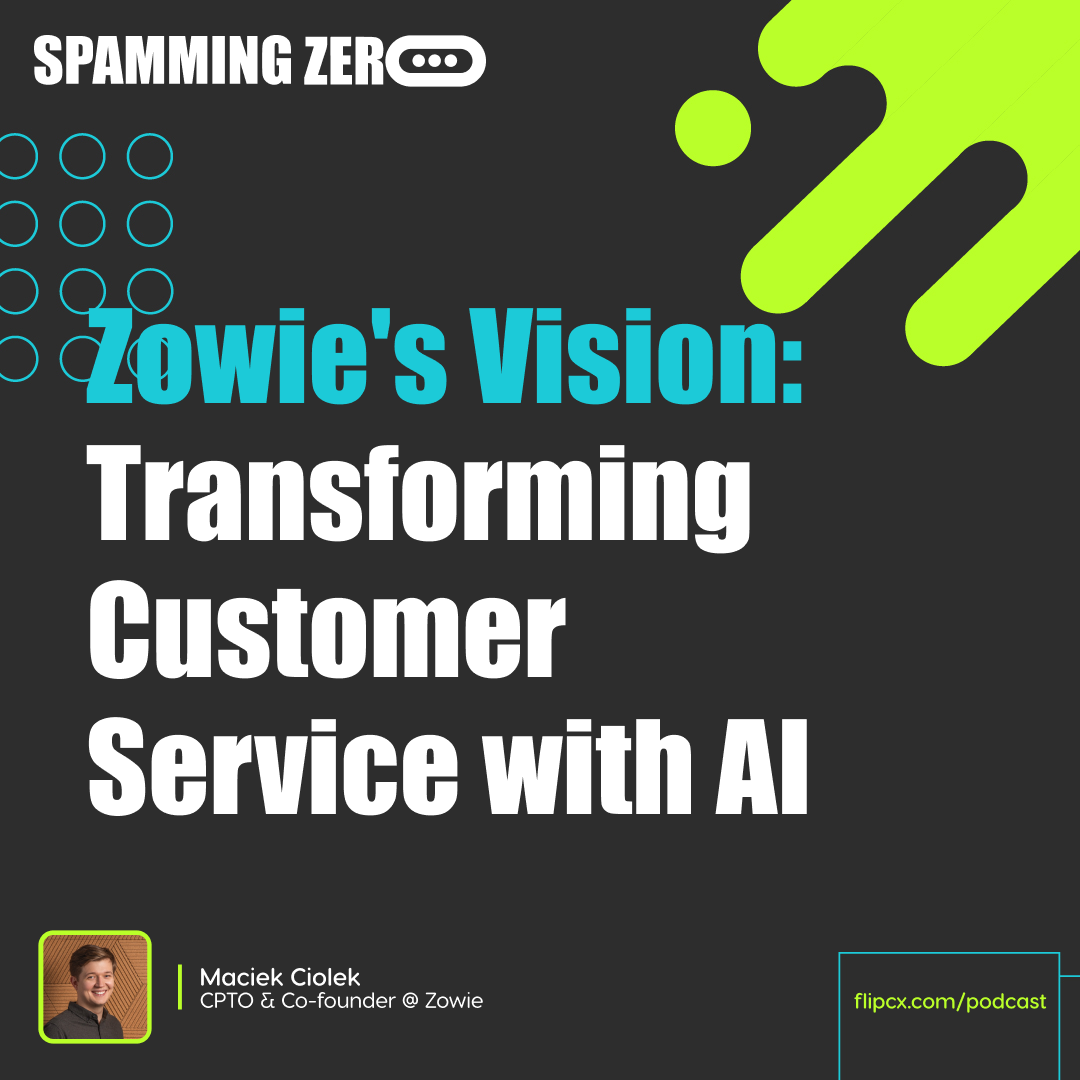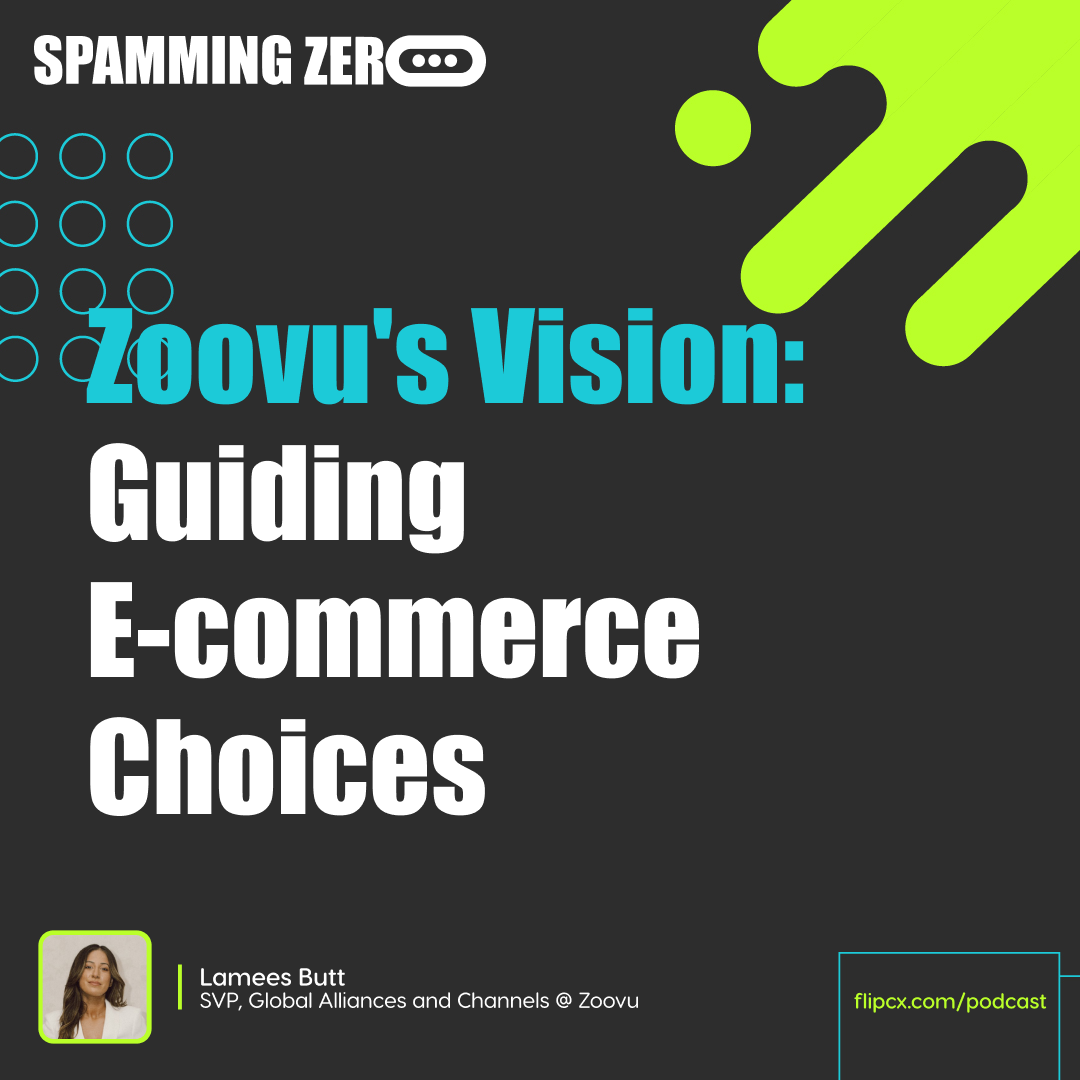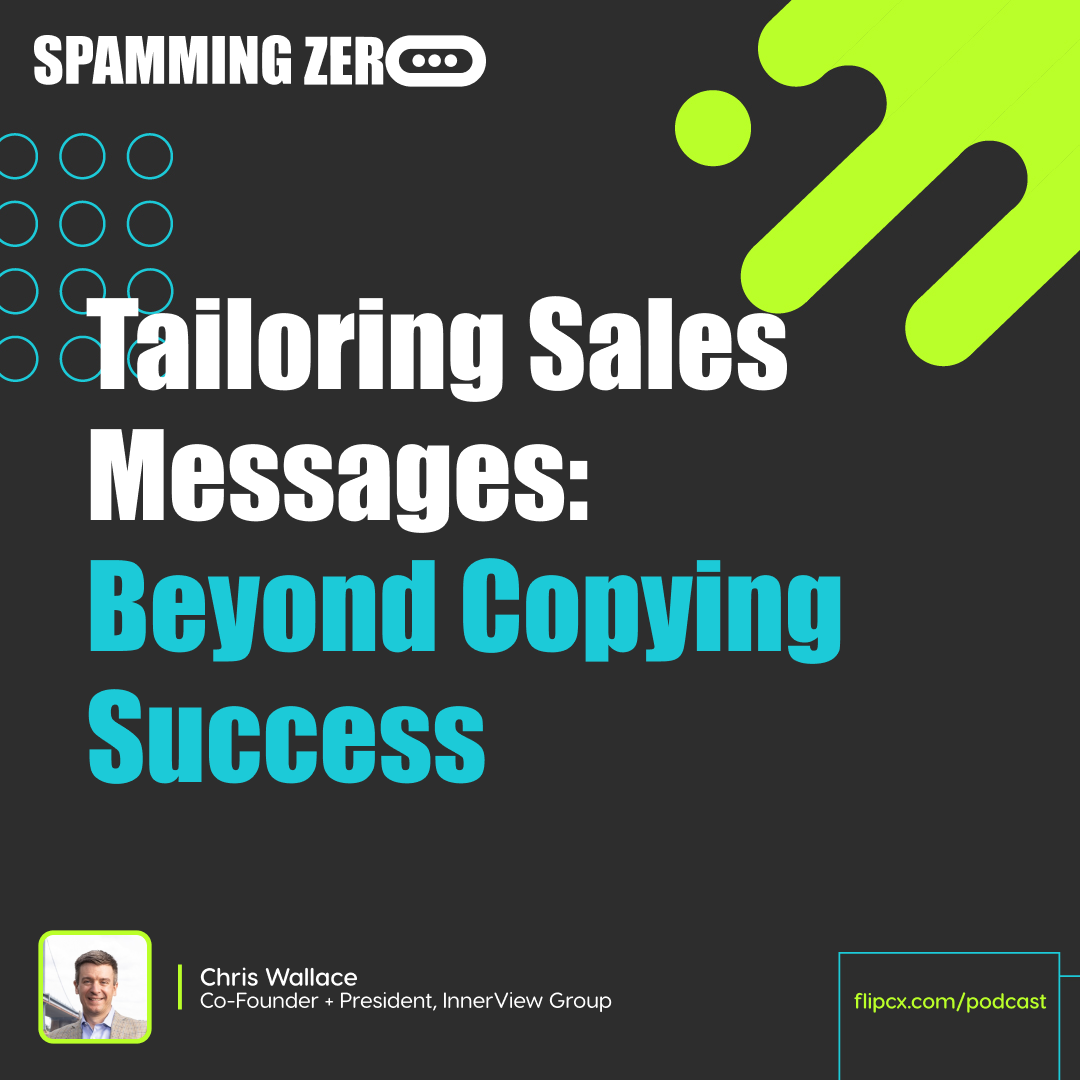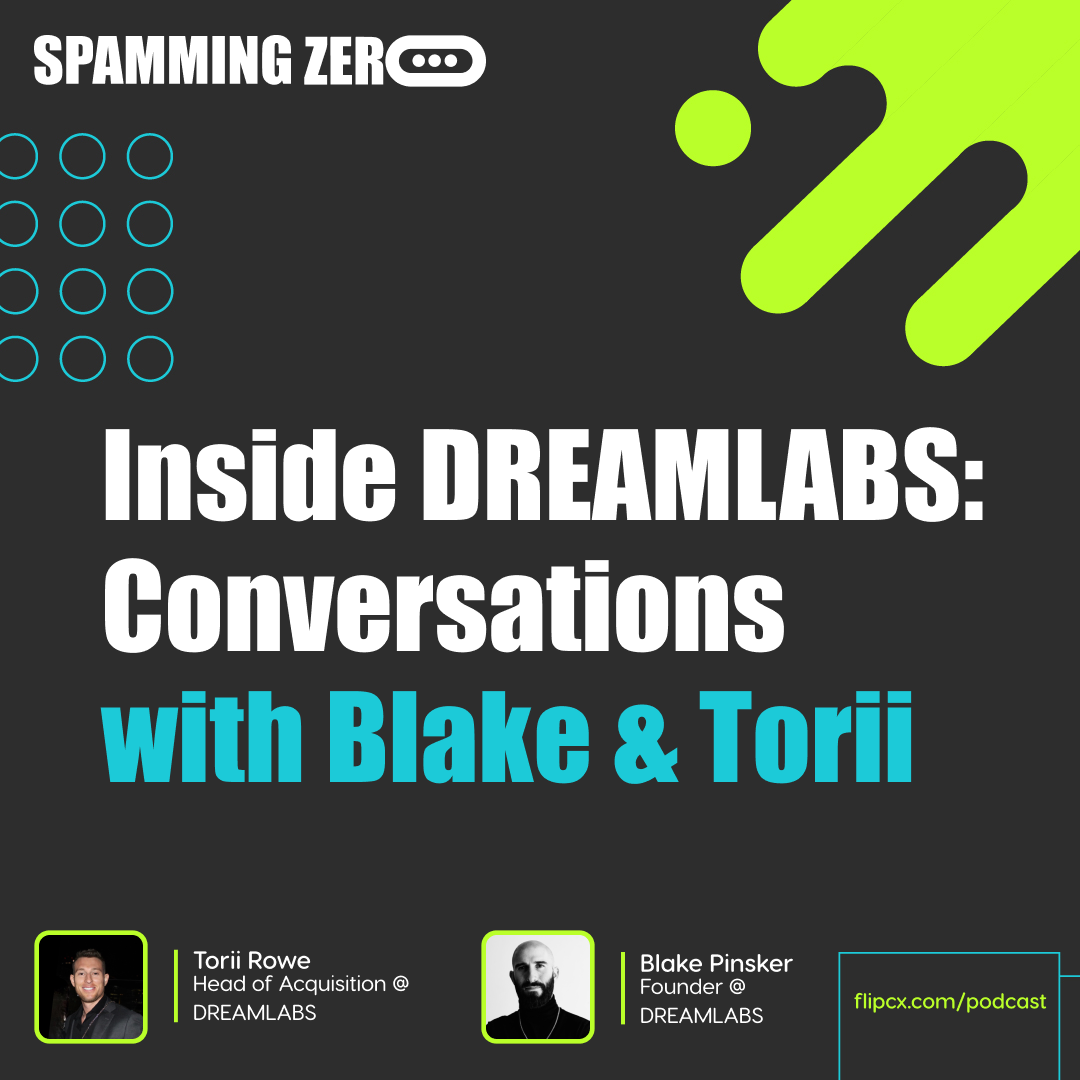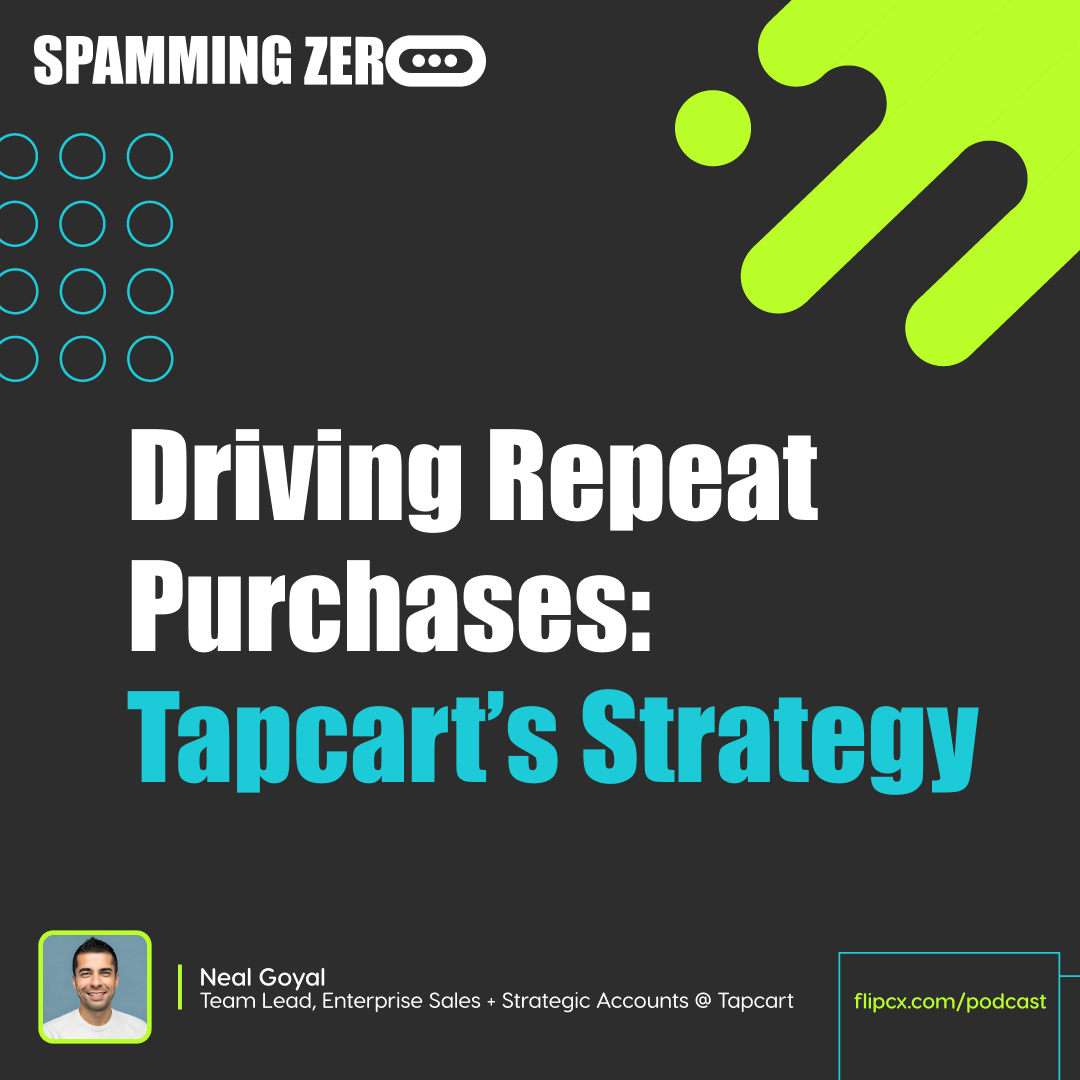Episode 61: If You Build It They Will Come - Establishing A Marketplace Presence As An Ecomm Brand
- 0.5
- 1
- 1.25
- 1.5
- 1.75
- 2
Joana McKenna: I don't want people to be replaced with an AI. We need to figure out how do we use it and how do we use it in a way that's complimentary to what we're doing today, but also complimentary to the development of my people. I don't want to use it to create copies, so then I don't have copywriters. I want to use it so that my copywriters can find ways to be creative with AI or be more efficient with what they're working on.
James: I'm James.
Brian: And I'm Brian.
James: And this is Spamming Zero. August 2023ie. This month's sponsor of the Spamming Zero Podcast is Richpanel. Richpanel. com. Go check them out. They do self- service automation at scale for e- commerce brands and direct- to- consumer brands. Some of their self- service models are order management returns and exchanges. They have a branded help center as well. Agent handoff, custom workflows, and very soon subscriptions. We love Richpanel. They're one of our partners as well. Here are some of their customers that use them, Thinks. Another one is Snow. If you're familiar with Snow, Brute Force, the Puppy Dogs, Ice Cream company, lots of companies directly in the direct- to- consumer world. Also, they have a bunch of different resources for their customer testimonials. Some of the integrations that they do directly on their website, love some of the stuff that they do. They also have a pretty wide range of partners that they work with. So if you're currently having a partner that has something in their stack and you're wondering if they integrate with it, they have a lot of that. But one of the biggest things that we get all the time is some of the order management. So the self- service options there. Let customer manage their orders. Customers don't need to raise a ticket to make edits to their Amazon order, change the shipping address, or they forget their coupon code. Give your customers the same experience on your website. That's what Richpanel does. Self- service automation. Richpanel. com. Back again for another week of Spamming Zero. Welcome everybody, and thank you to our listeners out there who continue to follow us every week. We're growing fast, and today we are excited because we are joined by Joana McKenna, who is this CEO of Jane. com. Also ex- Walmart, ex- Amazon, and ex- Johnson and Johnson, so she knows her stuff. Super excited to have her on. Welcome to the show, Joana.
Joana McKenna: Thanks, James. Super excited to be here.
James: So we have never actually talked about the topic at hand that we're going to talk about today, and that's marketplace, and you guys do it really well at Jane. com. So I'm especially excited to talk about how you envision doing those things. But before we do, we always like to get a little bit of a flavor of who you are as a person. So let's say you're stranded on an island. What is your go- to e- commerce retail shop? If you could bring it with you and put it on the island, where are you shopping?
Joana McKenna: Well, obviously, besides Jane, I'd have to say I'd probably bring Walmart with me. If I could bring it with me. It's a little bit of everything. It's easily accessible, all the food you want, all of the camping gear you'd probably need on this deserted island. So I'd probably do a shout- out to my walmart. com former team and bring them along.
James: That's a good choice. I had somebody else say Home Depot, and I think Walmart actually might take the cake, because they have the food and Home Depot doesn't. So I think you're picking pretty good there.
Joana McKenna: That's right. I'm like, I can build with Walmart and I can eat. So it inaudible purposes.
James: So Joana, tell the audience a little bit about who you are, a little bit about Jane. com. I love your vision, for example. I'd love for you to dive into that. So let's talk about that a little bit.
Joana McKenna: Yeah, so as you said, I'm Joana McKenna. I live in Park City, which is a lovely spot here in the United States, where you get to ski all winter and wake, surf all summer. I'm originally born and raised in Paris, France. I have lived all over the world. Just alone, in the last 18 years, we've moved 11 times. So we're definitely kind of gypsies on the move, always kind of up for an adventure and to explore the world. And currently I'm the CEO of Jane. com. So Jane. com, when I came on board was what you would call a deal site. So where you would go to find products heavily discounted for a limited amount of time, usually 72 hours. And I was brought on to drive the transformation to building the Jane. com marketplace. And so we're currently in the alpha stage of that marketplace launch. And for those of you who don't know what a marketplace is, it's similar to an Amazon, a Walmart, an Etsy, it's where third- party sellers and brands get to sell their products on your platform and their products can live on there forever. And really what's differentiating about Jane is that we are hyper- focused on women- owned companies. So women sellers, women- focused brands. We welcome all sellers, but that's really what we're hyper- focused on. And 95% of our sellers today are women- owned businesses and we play mostly in the Softline categories. So Think apparel, accessory, shoes, home decor, and then beauty consumables. So it's really kind of a niche area for us and we create a very unique, personalized, curated experience for our shoppers and that's why they keep coming back to Jane.
James: Love it. So before we dive into the marketplace, I got to ask, because I'm a Utah native, I've moved away for a little while and then we moved back. But I got to know what made you pick Park City?
Joana McKenna: I mean, if you've never been to Park City, I mean the minute you get here, it's like this beautiful little town. I think there's probably, I think 12, 000 people who live here. Don't quote me, it's not tiny. It's not just this tiny little ski town, but it's really just because it's close to a major city, Salt Lake. We're about 30 minutes door- to- door to an international airport that can take you anywhere in the world. And who wouldn't want that accessibility plus the ability to live where some of the best skiing happens in the nation.
James: It's very beautiful in the summertime too. See, I live on the southern side of Utah, so I get the feel of the Red Rock and the national parks and things like that. So it's a different vibe, but still Utah's a little bit of a hidden gem as we have all learned who can come here.
Joana McKenna: We're trying not to advertise it.
James: Yeah, I know, right? Don't come here. It's terrible.
Joana McKenna: Don't come here. It's terrible.
James: Okay, so let's dive into the marketplace stuff. First of all, why are you passionate about it? What made you decide to change Jane. com to this model?
Joana McKenna: I've spent the sort of latter half of my career in marketplaces at Amazon and at Walmart, and I am a huge proponent of the marketplace model. I think that if you are a sort of quote, unquote, " retailer", and you're buying first party from vendors, you can only carry so much inventory, right? It is not an endless shelf for you when you're a retailer. The marketplace component allows you to bring on all kinds of different vendors and products and really don't have to worry about holding inventory, shipping inventory in any of those components. And marketplace for me is also where we get to be super seller centric. And that means taking the eye of the seller, who's really our number one customer before the shopper, and how do we build the type of experience for them where they can scale their business no matter where they are in their growth journey. And marketplace allows you to be really nimble bringing on channel partners. So if you're a big seller and you need a PI Connections or EDI or you need fulfillment or you need tax services, we can implement all those, but also we can help support small sellers who maybe are just getting started and just need to help source materials or how do I set up a USPS account or all of those pieces. So marketplace is really the ability to connect with so many more sellers and brands, and really allowed them the flexibility to grow as quickly or as slowly as they want.
James: So I did a little bit of homework before the show. I'm going to read this. Tell me what you think about this. Because I think it plays really well into what you're saying, and a great move by you guys to do this. So I read just the other day, this is a big research that was done by Digital 360 Commerce, a big prominent research firm for e- commerce businesses. And they said 869. 8 billion is sold through marketplaces just in the US today and 3. 25 trillion total in GMV just this last year, which is in one year. That actually makes up 55% of the total global e- commerce spending. So if you're wondering if there is data to back up join its pitch to do marketplace, their 100% is.
Joana McKenna: Absolutely. I would even add that there was back, I think when marketplace started the one behemoth marketplace that everybody's like, " Oh, I have to sell on." And I think now you have a lot of different marketplaces that you can sell on, and you should really evaluate what is my channel strategy for my product? Where do I want to meet the customer and where can I tap into a different cohort of consumers that maybe I don't today? And I just think it's an opportunity to have multiple marketplace channels to reach a broader sector of consumers. And so you shouldn't just tie yourself to one. You should think about what is it that you want for your brand or for your products, and you should look at marketplaces, you should look at big box, you should look at retail, whatever's going to fit your model and have just multiple channels. You never want to put all your eggs in one basket.
James: Yeah. Well that brings me to another question that I have for you. How do you make sure that if you're an e- commerce company and you want to branch out into marketplaces, how do you make sure that you don't have the shiny new toy syndrome? You know what I mean? Like, " Oh, there's a new marketplace here, let's get it listed. Oh, there's new marketplace here." How do you make sure that you keep that consolidated?
Joana McKenna: I think it's really about having a clear vision, understanding your own personal strategy for your brand and your products and identifying who is your customer, who's buying this product. And that should help you identify what are the channels that you want to play in and also what are the channels you don't want to play in. That's just as important as identifying where you're not going to sell. And I think 10, 15 years ago everyone was like, " I need to be on Amazon." Where now I don't think that that's the case. I think a lot of people can find a lot of success having their own D2C channel, going to different pockets of retailers. And sometimes it's not big retailers, sometimes it's very niche markets, but I think it starts with identifying who is your customer? What is the customer base that you're going after? Who's shopping these products? And that helps identify what marketplaces to be in, because also what happens is if you try to be everywhere, you're going to overextend yourself and then you're not going to be able to allocate enough inventory to satisfy each channel.
James: So one of the things we talked about when we had chatted before doing the show live was we talked about what's in it for the seller. Which leads me to another question that I'd love for you to answer, and that's what do you think is wrong with marketplaces right now? I mean, clearly there's not enough emphasis on the seller, so can you dive into that a little bit?
Joana McKenna: I think a lot of marketplaces take the view of we're customer- centered, I think it should go without saying that you are here for consumers to find products and shop. I think you need to take the lens of the seller, what is it that your sellers need to be successful? Because essentially as a marketplace, you're a platform, you're a connector between the shopper and the seller, and what kind of tools and resources and even training are you providing your sellers so that they can be successful wherever they want to be on their journey or however big they want to be on your channel. So I think that's one reason why some marketplaces struggle. The other is saturation. So having way too many of the same products doesn't allow for sellers to be successful. They get really frustrated and they can't essentially get more of their product out or build their brand. The other big component for me is, and I think it's something as the next couple years go on, you and I have talked about this, is there is a big threat to the sort of consumer and retail economy here in the United States, and that's Chinese marketplaces, and allowing a lot of Chinese sellers to come on who are not vetted and who don't have US supply chain fulfillment and who are essentially knocking off hardworking American companies and their products. That's a big problem for marketplaces as well.
James: Yeah, it's a little bit of a threat to retail all in general. We had talked about in our pre- show where we were trying to decide what we wanted to hit on, and TikTok now has marketplaces and there needs to be some concern there. And we're going to dive into that in just a little bit. But before we do, I go to the library a lot. I go to the bookstore a lot because I'm a big reader, as you can see behind me, there's tons of books, and they always have these topic for dummies. So we're going to do a marketplace for dummies for a second. I want to walk you down this path and I want you to coach all of us on it. A lot of brands that think about marketplaces, they have questions like, " Do I need to manage the support of the supply chain? Do I need to manage the full supply chain? Do I need to manage the inventory control or are they going to do that for me?" So talk to us a little bit about that, walk an e- commerce brand through some of that and those type of decisions.
Joana McKenna: So I think again, it's very different depending on the brand and depending on the growth of the brand. If you're very small and you're doing fulfillment all on your own, so you don't have multichannel fulfillment, you're going to want to go to a marketplace that either provides fulfillment as a service or you're going to want to partner with a vendor. Deliver was always a great example that can do multi- channel fulfillment, that can fulfill your orders for Amazon and for eBay, for Walmart and all these other places. And I think if you leverage one of those, then you can also easily manage your inventory levels, because then you're able to look in one dashboard and understand where is my inventory? Do I dial up or dial down based on how my sell through is happening on each of one of these marketplace channels? So my advice always to brands is it's hard to do fulfillment on your own, number one, I highly don't recommend it if you're going to go multi- channel, and looking for a partner that provides this fulfillment, usually the best is they store your inventory, they pick, pack and ship for you, and they also manage returns for you. That's a big one, because you don't want to end up with tons of returns coming to your headquarters, especially if you're a small seller and your headquarters is your home and then you're getting thousands of products back to your home.
James: I love this because I can only speak to this as a consumer, somebody who shops on these marketplaces, and I kind of want to go down two paths just for a second. There's one path of when I reach out to on an Amazon support, for example, sometimes they will send me directly to the seller and other times Amazon will fulfill the support entirely. And that's kind of what Joana's talking about, it's based on your business need and you do have those options in these marketplaces. The second path that I want to go down is how do you try to create almost user control or I want to say maybe share of wallet. They're on these marketplaces and there's a lot of different things that people can buy. When I go on Amazon, I almost never just spend one on one item. It's usually on multiple. So what are some ideas that marketers could take and e- commerce marketers could take to make sure that their products are top of mind when they're in these marketplaces and they can expand those and they're not going elsewhere?
Joana McKenna: Yeah, I think one is looking at sort of adjacent categories and whatever category you're selling in, what are some of the adjacent categories where either you feel you're complimentary and in which case you can kind of tack on from a marketing perspective, or you feel that, hey, we can create this adjacent product line and capture more of this market share and then have these customers bought similar ads or these products go with. I think what becomes difficult is when you're on these very big behemoth marketplaces where it's sort of like everything and it's hard to differentiate yourself and stand out, and it's very much a pay- to- play model where a lot of brands, that becomes very difficult, because if you're starting to sell across all of these channels and you have to pay in order to win in terms of search and discovery, it can get, one, expensive, and two, very hard to market and kind of get those adjacent categories and complimentary sales together. So it's really about finding what niche are you in and then having the adjacents next to you, but also when you're looking at marketplaces evaluating like, " Is this too big for me? Am I just going to be swimming to the bottom of the ocean when I launched on this marketplace?"
James: So let's dive into this a little bit. Barrier to entry into a marketplace is oftentimes where people get stuck, like where do I start? How do I get started? Do I need a marketplace? How do you at Jane. com create a low barrier to entry here? Talk to us a little bit about your model, but then also give some advice on how they could go about looking into this thing.
Joana McKenna: Yeah, so in the new model with Jane's marketplace, it's really about where did we identify all the friction points and the barriers to entry to come onto our marketplace and how do we just remove them all? Because it really should be easy. You should either be able to just easily in five minutes, create your account and start listing your first item, which is one avenue to get onto Jane. The other is to quickly just have an Excel spreadsheet, which is called a CSV file, with all of your items and the product attributes, upload and populate all your listings, decide which ones you take live, or if you're a more advanced seller or you sell on multiple channels, maybe you're using something like a Feedonomics or Scanova or ChannelAdvisor and you want to just push through, or even your Shopify. So I think there's three ways to come onto Jane where we just want you to come on as easily as possible. And then we want also you to be able to control your inventory, your pricing, and get your orders, feeding back through very quickly so that you can concentrate on just growing your business. I think if you are not having that experience on a marketplace today, if you're spending tens or hundreds of hours managing and trying to get your inventory up or your pricing up or your listing created, then it's probably not the right marketplace for you because you're wasting your time doing that.
James: I like that. I like that a lot actually. So a couple more questions. One of them is around the idea of keeping your marketplace in a place where it's accessible also to the people that you want it to be accessible to. So let's say I have products and I have an e- commerce company and I want to list my products on a Jane. com, on a marketplace like that. What's the value in making sure that, one, it's going to be in front of people, and how do I convince my team if I'm trying to convince executive leadership, " Hey, we're going to list these things in marketplaces." How do I convince them that that's going to be important for me?
Joana McKenna: So I think, again, depending on your company's size and product, it's really about what is the long game for your brand and for your products? And identifying where are the channels you want to play. And sometimes you don't want to go to marketplace because you don't know enough about it yet and you want to kind of dip your toes and maybe going to retail or you want to do complimentary with other products and partner up with other brands and do collaborations to see how the growth happens. But I think the benefit of marketplace is that you stay in control. Whereas if you're selling from a first- party perspective to a retailer or even to the one piece side of a marketplace, first of all, they're going to beat you up on price and they're going to take you for 30% off of your pricing, and then they're going to ask you to pay for marketing and all these other pieces where on the 3P side, you control, your content, your inventory, and you set the price, and you control how much you want to spend on advertising. So it's really more complimentary to a company that even has its own D2C website to go to marketplace to first test out is this product going to be successful here or is there a demand for this product rather than going the route of a retail first P model.
James: I like that. So you've created a vision at Jane. com of women owners, and I want to dive into this a little bit. It would be silly if we didn't. This is an important part of your business model. I love it. I think it's incredible. I'm a big advocate for this. Growing up, my mom was a single mom, worked her butt off to raise six kids. Yeah, she had six. It's crazy, but that's what she had. And I remember just all the time how much it was really hard for her. We grew up really poor, and I think there's more opportunity for women than there ever has been in the world today. And I love the fact that you have a vision of this, and I want you to dive into a little bit more like why did you create it? Why did you want a vision like that?
Joana McKenna: I think it's important because even though there's a lot of opportunity for women today, we're still far behind the course. I think I saw an article the other day that said it's going to take us another 125 years for women to get pay equality. 125 years. And so when I think about our opportunity at Jane, while we welcome all sellers, you can come sell, our focus is on women because we have a lot of stories of over the last decade, women who started businesses at their kitchen tables and have now grown them to seven, eight figures solely on Jane. And now not only do they take care of themselves, and some of them, their husbands work for them, but also they employ people in their communities and they now have offices or manufacturing where they live. And we always say, when you buy something on Jane, you're not just buying something like another marketplace, you're buying into something. You're buying into someone's dreams, you're helping employ people and provide for people. And we want our marketplace to be different in that sense that when you're selling here, we're also going to give you the support. We're going to give you the tools and the training, and we're going to have the right channel partners if you want to plug into them, that can support you. Again, if you need fulfillment, if you need tax help, if you need branding, who are those partners? And we're going to vet for you and make sure that they're the right partners. That also tie into the ethos of what we're trying to build here at Jane.
James: I love it. Would you be willing to share one of the stories?
Joana McKenna: Yeah. So there is a graphic T seller, Simply T's, who has been with us since the existence of Jane and just started as a graphic T seller printing her t- shirts, and now it's a husband and wife team, but now they have a huge graphic printing facility that they built and they employ dozens of people, and they're a great seller and a great story. And there's so many of those of Jane, so many of these women who just had an idea and were given a platform and an opportunity to grow that idea.
James: Another one that's local to Utah that exact model reminds me of is Thread Wallets. I don't know if you've heard about them, but she started with the idea and she's the CEO and her husband is the COO or something like that, but they're doing the same thing, and I love it. I think it's incredible. Okay, so early in the podcast we talked just a little bit, we gave a flavor of the risk of what's out there with foreign marketplaces. Let's dive into that a little bit. First of all, what should people be looking out for, and what should we avoid?
Joana McKenna: It's hard, because a lot of marketplaces that are much bigger than Jane, it's like Pandora's box has been opened and you can't close it. And the problem, there's a lot of great sellers that are international sellers, even in China, there's some big sellers who create their own patented products and they have fulfillment and offices here in the US and they do a really good job. So I don't want to carte blanche it to everyone, but the problem is, and the reason why we're very stringent on vetting sellers that are not US- based sellers, is because majority of the time your product is getting knocked off. And in China specifically, you can't enforce your patent. You can't enforce your intellectual property, because they're not going to take any action on it. And you see it more and more now on the marketplaces like Shein and Temu, where they scrape sites like Amazon, Walmart, Jane, and see products that are trending, and within 24 to 36 hours because they own manufacturing, they have knocked off your product and are selling it online for a fraction of the price. And it's really dangerous to think about what that's going to do to our economy and to the retail economy and to businesses here in the United States. Because if they can't compete with that, and if the US consumer isn't being educated on it, they're going to buy a bag for$ 7 on this other marketplace because they're like, " Oh, it's the same bag and I'm not going to pay 59. 99 here in the US." But it's not the same bag. And you're also hurting a business here that employs people in the United States and has a company here in manufacturing. So I think it's one of the biggest threats that's sort of here, but also speeding up very quickly. If you see the penetration when you think about their marketing budgets are in the hundreds of millions, if not billions of dollars. So it's very hard for businesses and marketplaces to compete, because everywhere you turn, if you turn on your iPhone, your Android, you're online, you're getting an ad for Temu or for Shein, for any of these marketplaces. And the US consumer usually doesn't know the inaudible.
James: Yeah, it's interesting because there's been so many times, this even happens on Amazon and some of the bigger ones too. There's been so many times where I'll go to a marketplace and I'll search for a product. I maybe saw an ad and I didn't want to necessarily buy it directly through the website, so I wanted to look at the marketplace, and some of these will totally copy the imagery, and it makes it look like you're literally buying the same thing, but sometimes they also sell it for the same price. So then you get it and it's not even close to the quality, but you paid the same price for it and you actually thought it was related to the brand, and then you go find out through the support that it's not even related to the brand at all. So this stuff is happening all the time, and it's a little bit crazy that we don't have more control over it. And so I love the fact that you're talking about this because I do think that there is an opportunity for brands like Jane. com who are creating marketplaces where this is a very real thing that you guys are considering and thinking about. I think more marketplaces need to do it. I think it's a huge problem. I really do.
Joana McKenna: It's a huge problem. And it's also about supporting our sellers who are manufacturing in China and helping them understand the type of terminology they need to have in their agreements with Chinese manufacturing, because they can take your mole and essentially make it theirselves and just slap a different name on it and sell it, and you can't do anything to stop them. So you need to think about what does my agreement say? How can they use my inaudible? How can they use my product line or anything that I'm designing over there. But I think it's also super dangerous when we think about consumable products. So when we think about beauty and health and wellness, so skincare, things that you're putting on your skin makeup or the vitamins you're taking or the shampoo you're putting on your hair, a lot of that on some of the major marketplaces are coming from China, and sometimes they're straight knocked off products, but sometimes they're expired products and it's super dangerous. So when we think about our consumables and our sellers, we go directly to the brand and it has to be the brand that is selling on Jane or has provided us the one or two distributors that they have authorized to sell their products. Because you run a huge risk of somebody getting sick or something worse happening. And also, it's just extremely dangerous when we think about consumable products, like you don't want to be having vitamins coming from China. They need to be manufactured where you know the route of where they came from and where there's authenticity to the product.
James: I really like this because this literally happened to me personally. I purchased a pre- workout on Amazon. I thought it was the real thing, just like from my previous experience, I thought it was the real thing. I bought it and I took it and I actually had a huge reaction to it. It was really, really bad. And come to find out, I then later reached out to them and it was a completely different support, and it was not them. It was actually a knockoff. And the product was not the same. So I definitely agree with that, especially when it comes to things that we consume and put in our bodies. It's pretty wild that we even allow those things to come at all in any US marketplace, whatsoever.
Joana McKenna: Well, you'd be really surprised. There is a founder and CEO of Beautycounter, Gregg Renfrew, who does an enormous amount of work on the Hill, in DC, working hard to get laws passed around skincare, around beauty, around the ingredients that are going into this. There really is no guidelines, there are no laws in place or requirements, there's nothing that needs to be passed by the FDA, which is really concerning when you think about if you use a shampoo, anybody can make a shampoo, and you don't know what ingredients are in there and you're putting it on your body, you're absorbing it. And that's why when you're shopping really on marketplaces, if these marketplaces are very saturated with Chinese sellers, you need to think twice before you purchase those products. I would say I would rather you went directly into the Walmart or you went directly into CVS or Walgreens or wherever you shop and bought the product directly, because they are buying in bulk directly from the manufacturer. So you know that the product you're getting is safe.
James: Yeah, it's a really good point. All right, Joana, you've dropped some serious amazing insights on this show, but now we're going to do something, we're going to do our fun little game. So a little bit of FMK. So when you think about e- commerce, just in general, what do you think is really sexy right now?
Joana McKenna: I think what is really sexy about e- commerce in general?
James: Yeah. Yeah.
Joana McKenna: I think what's sexy about e- commerce is really the technologies that are coming to play that are going to allow us, hopefully as we get smarter, is not to be online and connected all the time, but to shop smarter, to get access to products that maybe people couldn't access before, and getting them delivered at speeds that are really fast, not because they're shipping them all over, but because the technology now is really crowdsourcing, from where are these products available close to you to reduce carbon footprint to get it to you faster. So I think that's what's really sexy about e- commerce right now is those technologies that are coming into play.
James: Love that. Okay. So what's been around a while and it's here to stay?
Joana McKenna: What's been around a while and it's here to stay, in e- commerce or just in general?
James: Yeah, in e- commerce.
Joana McKenna: I think in e- commerce, I think what's been around a while is the retailers that are playing in e- commerce, they're here to stay. I think there's been lots of talk over the last couple of years, retail's dying, no one's going to retail. I think retailers have done a really good job in pivoting and creating spaces for people to shop online, but also then taking some of those technologies and embedding them into their stores. So I think retail is here to stay, brick- and- mortar, and it's going to be complimentary to e- commerce.
James: I love that. That's a hot take right there. I couldn't agree more. There's brands that are doing this incredibly well. One of our customers, Untuckit. They do a ton of cool stuff at their brick- and- mortar retail stores, and it drives more traffic to their stores than it does to their websites. So you're onto something there. Okay. So the last one is, what would you kill with the current market in e- commerce right now?
Joana McKenna: I think you and I talked about this before, I'd kill AI right in its tracks, right where it stands today. And the reason I say that is it's that shiny new object, and people are really predictable. When something's shiny and new, everybody wants it and they want it fast. And it doesn't matter if you're Google or Microsoft or anybody, everyone's like embed it, make it available, figure it out. And I think there's a big risk if you don't really put in parameters and understand the risks. I think even if you're using it to create content or in our case PDP, product detail pages, you have to be careful because it's essentially aggregating information historically posted online that's available on the internet. And it could be giving you false information, it could be giving you wrong information. It could be essentially stealing someone else's IP that you're then embedding into your own site. And I just think while it's super cool and super fascinating, I've spent a lot of time in ChatGPT going down the rabbit hole of checking it out, what can it do? But at the same time, I think that's why a lot of, even the CEO who created ChatGPT has said, " Hey, we're going to need some regulation around this. We're going to need to understand what we're allowed to do, not allowed to do, what people can do." And I think it's important, especially I think about us in e- commerce. I don't want people to be replaced with an AI. We need to figure out how do we use it, and how do we use it in a way that's complimentary to what we're doing today, but also complimentary to the development of my people. I don't want to use it to create copy, so then I don't have copywriters. I want to use it so that my copywriters can find ways to be creative with AI or be more efficient with what they're working on. But again, it's going to be different for every single business. But I think that's something that I would literally stop in its tracks today because I don't think that we know enough about how it's going to be used. And I think we've already seen examples of how it's going to be used in really bad ways by people, and that's just the tip of the iceberg.
James: Yeah, I definitely hear you loud and clear for sure, because there's not a lot of talk about the guardrails and the governance and the ethics behind it for sure. And what you're referring to is more like the generative AI stuff, which is, there's a lot behind that and there's a lot of different paths that we could go down and talking about that. But I do got to say one thing, AI in general, I've said this from the very beginning ever since we started at Flip, it's like AI's never going to replace Siemens. The goal here is to make it, to your point, make humans more efficient with their time and their efforts. But I do genuinely believe that it is up to the vendors who either, one, produce an AI product, or two, are selling an AI component of their products to anyone in e- commerce. I do believe it is their responsibility to educate, communicate, and make sure that it is crystal clear for any vendor using their product that there are guardrails and governance. And if there's not to be crystal clear about that, because there are real situations that are happening right now, where there are companies claiming they can do these things and they've not put guardrails or governance around it. E- commerce companies are buying those AI products and they're implementing them with no vetting whatsoever. And that is what's scary. And I agree that's what needs to stop.
Joana McKenna: I 100% agree. I don't think AI itself is going to replace human beings, but I think companies who aren't very clear on what they want to use AI for, what are they trying to solve? What are they trying to improve, will misuse it. They'll be like, " Oh, well, why do I need a team of copywriters?" Or, " Why do I need engineers to code? I can just use AI." I think that's a big risk and a huge mistake where you then eliminate the actual people because you think you can use this technology to replace them. And I don't think that that's the right way to use AI in any form. And you have, again, yes on the vendors to be very clear on guardrails and governance, but also on the business owners themselves, right? On the companies that are engaging and wanting to use AI, you need to understand what it is. And more importantly, what is it that you are trying to do as a company that you think AI can help improve or solve a solution for you?
James: Love it. All right, Joana, we're at time, but we got to ask our last question. Tell us about an experience that you've had with a brand that you've loved and that you just can't stop thinking about.
Joana McKenna: I will say this is one of the greatest stories ever for me. I had been at Nordstrom in the store. I was leaving in about, I don't know, 12, 15 hours to go on a family vacation, and I had bought these pants to wear. I got all the way home, this is in Seattle, 15 minutes in bumper- to- bumper traffic all the way home. I'm packing, and the person who checked me out had left the sort of metal detector on the pants. So I called the store and I told them my situation, and they said, " No problem. Give us your address." And I'm like, " What for?" They're like, " We're sending someone to you." And about an hour and 20 or an hour and 30 minutes later, and even probably more hellish traffic, this young woman showed up with the apparatus to remove it, and I was on my way. It is just clearly indicative of sort of Nordstrom's very soul and ethos of what they do. They are very customer- centric, and they will go above and beyond, because they know that these kinds of efforts will make you a customer for life. And we can get bogged down as brands, as companies in the day- to- day monotony of the work and the complaints from customers or anybody. But you have to remember that every opportunity that you have with the customer is a touch point for you to make a lifelong customer. And going above and beyond doesn't cost you anything. It really is going to help you solidify why people keep coming back and shopping to you. And ever since then, I have been a lifelong Nordstrom customer. I shop with them all the time, and those are the type of experiences that you really want to have everywhere you go.
James: I love it. Because it's also a play on the proactive support too, right? You called, yeah, but they were proactive in making sure, " Look, don't lift a finger. We got this. We'll take care of you." That's so cool. It's, I've never actually ever heard of any brand ever, going out of their way to show up to somebody's house to fix the problem.
Joana McKenna: This is literally the only brand that's done that. The other brand that I would just quickly say is also has been truly amazing, and why I've always bought a lot of products from that, has been L. L. Bean. I think a lot of people took advantage of there are lifetime guarantee. People would go to thrift places and then try and return and get the cash back for their shirt. But anytime I bought shoes, it could be 10 years later that my shoe fell apart. I can still today call L.L. Bean and they'll make it right. I'll send them the defective shoe that fell apart, they'll send me a brand new pair, whatever the version is. So they're also just another great example of they can't come to your door because they don't have a lot of flagship stores, but they will make it right When you buy from L. L. Bean, they want you to be a customer for life and they really mean it.
James: Yeah, I love that. You know who else does a really good job of this is Chewy for animals. We don't need to get into that. They have been-
Joana McKenna: They did it for me when my lab passed away. I know all about it. And again, so it's like finding what's important to your customers. Why do they shop with you? They shop with you because they love the brands, the clothing that you carry. How do you make that easier and better for them? Chewy, you shopped there because you have a furry animal that you absolutely love or some sort of quote, " that you love", and so they're going to show up for you. And they also know when your pet passes. That's sort of a passing for them too, that maybe you're not going to get another pet, but they want to make sure that you know that they cared, they really valued you during the time that you shop there. And those are the brands that, again, that's why they stand out. That's why you hear stories about them all the time.
James: 100% agree with you. Joana, you have been amazing. Thank you so much for joining us on the show at Spamming Zero.
Joana McKenna: Thanks for having me.
James: If you've not yet subscribed to the podcast, do so. Reach out to me on LinkedIn or email me at james @ flipcx. com. I'd love to hear from you if you have a topic or somebody that you want to have inaudible week.
DESCRIPTION
Blink, and the world of E-Comm has evolved. Marketplaces have emerged as a transformative force - something Industry Leader Joanna McKenna has some fantastic insights around. She shares them this week, on Flip CX’s Spamming Zero podcast.
What’s Covered?
- The challenges E-Commerce companies face when deciding to branch out into marketplaces
- The potential of marketplaces in E-Commerce
- The evolution of E-Commerce and the role of traditional retail
- The importance of evaluating channel strategy and considering multiple marketplaces to reach a broader consumer base
- What it takes to stand out in large marketplaces
- And more
Ready for more fantastic Spamming Zero conversations ahead? Listen, rate, and subscribe on YouTube, Casted, Apple Podcast, or Google podcasts.
